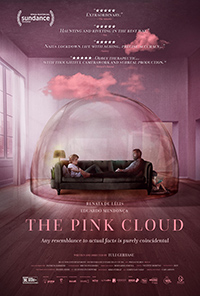Endemic Pandemic: Gerbase Unveils Prophetic Debut of Life During Lockdown
 The uncanny prescience of Iuli Gerbase’s directorial debut The Pink Cloud is as stunning as it is dumbfounding. We’re warned in the opening credits of the script being penned in 2017 while filming took place in 2019, well before the onslaught of the COVID-19 pandemic would interrupt our existence and grind life as we know it to a halt.
The uncanny prescience of Iuli Gerbase’s directorial debut The Pink Cloud is as stunning as it is dumbfounding. We’re warned in the opening credits of the script being penned in 2017 while filming took place in 2019, well before the onslaught of the COVID-19 pandemic would interrupt our existence and grind life as we know it to a halt.
Of course, Gerbase’s scenario is more strenuous and detrimental, but effectively it conjures the reactions to a reality which would have been considered unprecedented when it was created. In essence, Gerbase made an arthouse sci-fi film premiering in a world where it now plays like a logical melodrama. A prophetic study on human behaviors stymied by a doomsday scenario, Gerbase’s microscopic observations feel painfully accurate when at one time they might have been described as chilling but from the safe distance of fantasy and escapism. Now we’ve been inside the eye of this storm, and as such, it’s a debut which is upsetting and uneasy but also strangely comforting.
After meeting at a party, Giovana (Renata de Lelis) and Yago (Eduardo Mendonca) share a night of drug-fueled passion. The next morning, they awaken dazed to a world drastically changed. Alarms sounding off in the city urge everyone to move indoors and shut all the windows. A pink cloud engulfing the city kills whoever breathes it within seconds, and they learn from the news it is happening everywhere. Life comes to a standstill, and everyone is trapped wherever they were last. Stuck inside together, the strangers make the most of it, adjusting to a new normal of online work as they deal with their own familial connections, such as Giovana’s preteen daughter who was stuck in the home of a friend after a sleepover. Yago’s father, an invalid, is locked inside with his male nurse, his dwindling memory and delayed access to medication a cause for alarm. The government erects plastic tubes in which people are able to obtain groceries, and life settles into a surreal new routine. Becoming pregnant, Giovana and Yago find themselves parents in the lockdown, and eventually, they tire of one another, separating themselves into opposite floors and schedules within Giovana’s flat. The outside world invents new virtual tools so people can stay connected virtually, but as years crawl by, Giovana finds herself unable to forget the life she once had.
Eerily, Gerbase navigates the logical ways humans strive to stay connected in a locked down environment, the rise of new interfaces and apps designed to be the next best thing in the absence of human interaction. Along with it, the conspiracy theories bred from lack of leadership, the rumors of ‘the new natural selection’ hinting at political undertones Gerbase steers clear of, mostly because the focus is Giovana’s constant struggle with her own grief over a world long past. Considering the parallels between the fumbling, bumbling presidential administrations in both Brazil and the US throughout an actual pandemic, one wonders if this would have been a stronger component in The Pink Cloud had it been conceived in 2020.
Renata de Lelis portrays Giovana as the perfect balance of a woman we can easily understand and relate to but who is also difficult to like. Perhaps because we can see fractured constellations of our own selfish misgivings in her self-absorption and need for escape. Luckily, they live in a building where they’re at least insulated from those with pets or children (the invention of robot dogs to help with loneliness are mentioned but not seen).
The provocative decision to have a child for lack of anything better to do seems disastrous, with Giovana and Yago getting inventive with spatial allocations in the ups and downs of their seemingly predestined relationship. Gerbase doesn’t spend too much time on tangents, but it’s enough to juxtapose the plight of others, such as ailing relatives (Yago’s homophobic, dementia-suffering father) and Giovana’s single best friend struggling all these years alone in her apartment. The worst, as always, is the promise of hope, when the pink sky turns an iridescent green, like Aurora Borealis, suggesting the atmosphere has perhaps cleansed itself and humans can again venture outside. Gerbase teases her characters and the audience with the terror of tantalizing release from a wearying captivity, ending on a perfectly ambiguous note.
Reviewed on January 29th at the 2021 (Virtual) Sundance Film Festival – World Cinema Dramatic Competition Program. 105 Mins.
★★★½/☆☆☆☆☆


